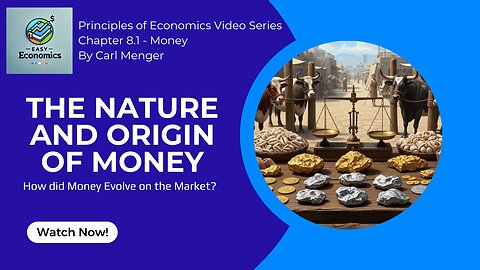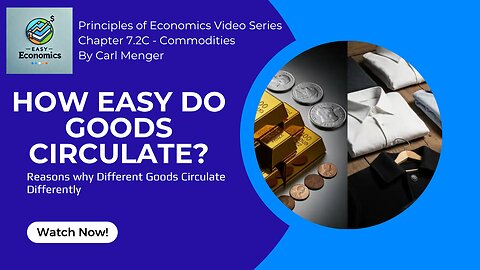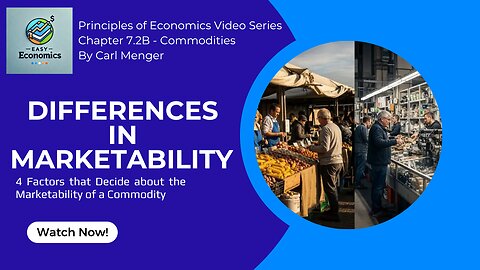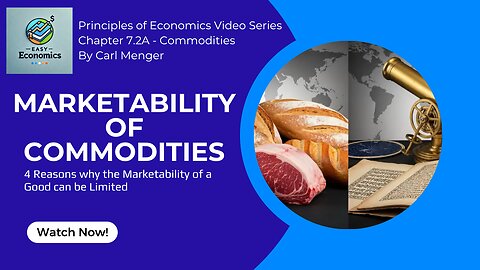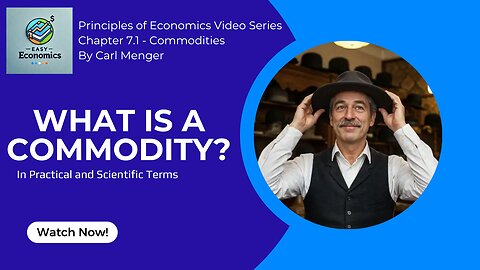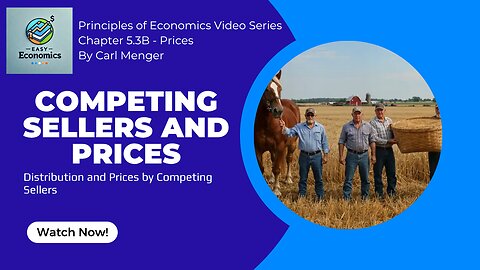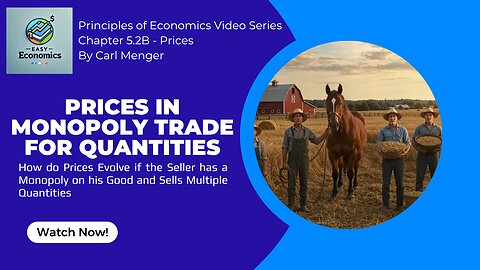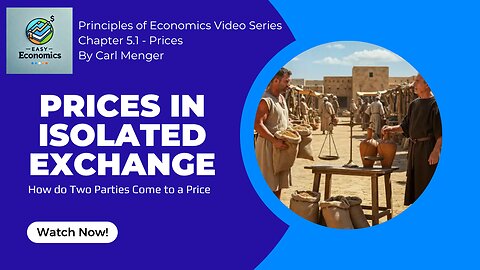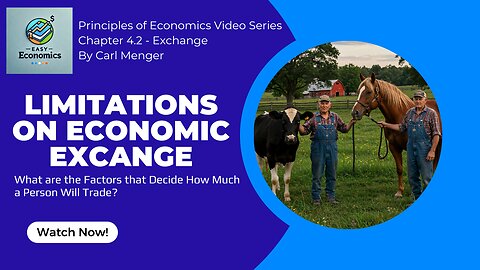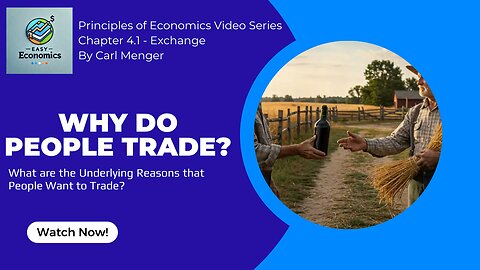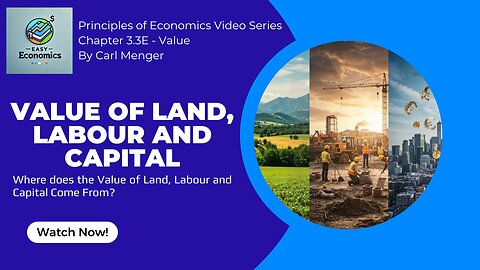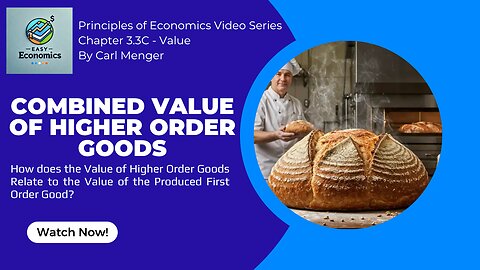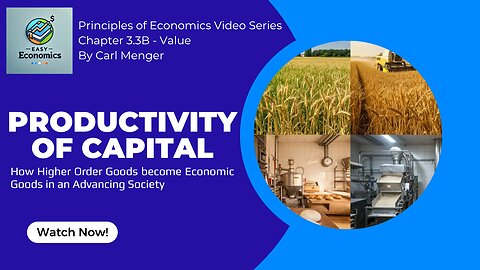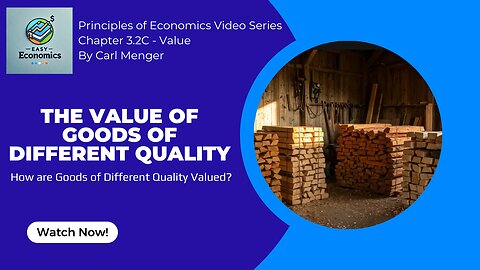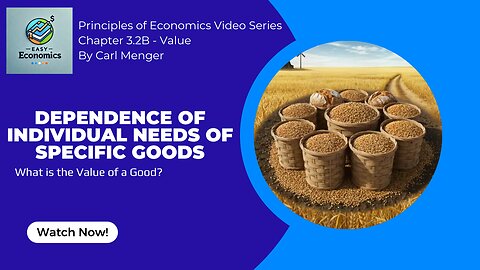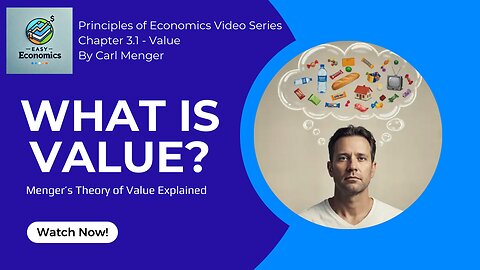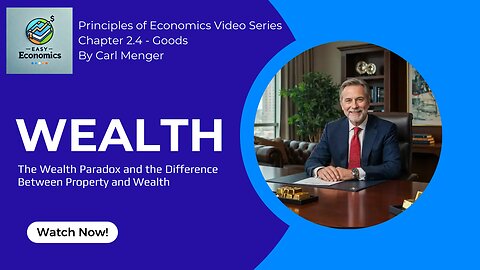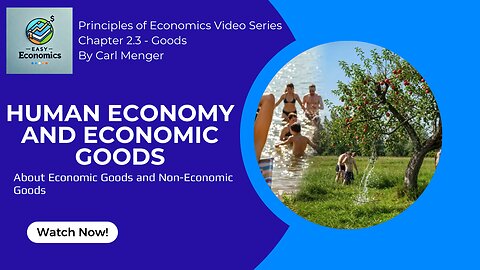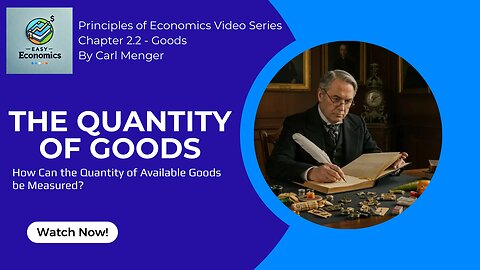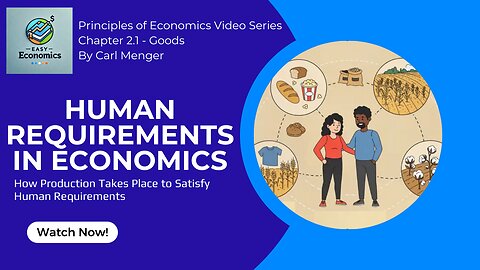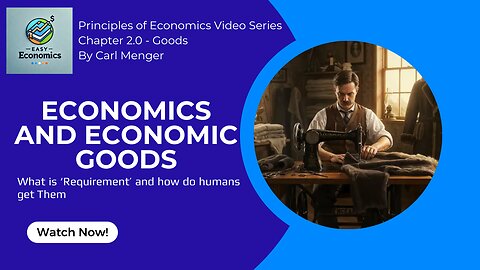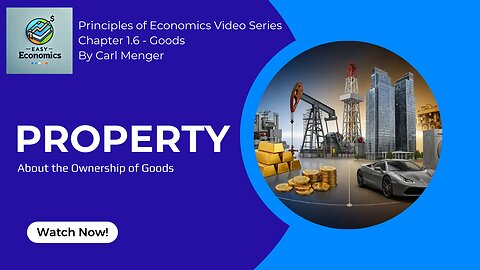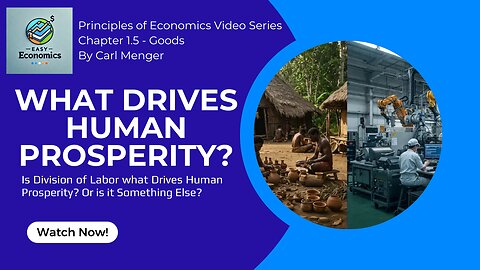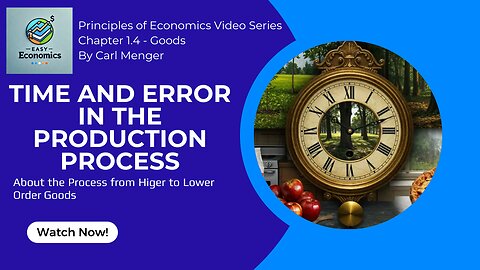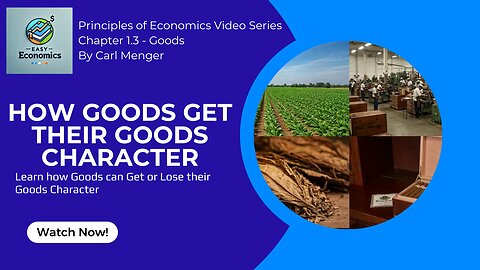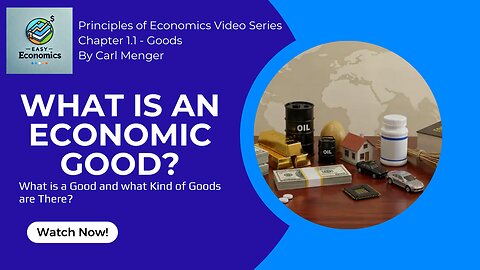Premium Only Content
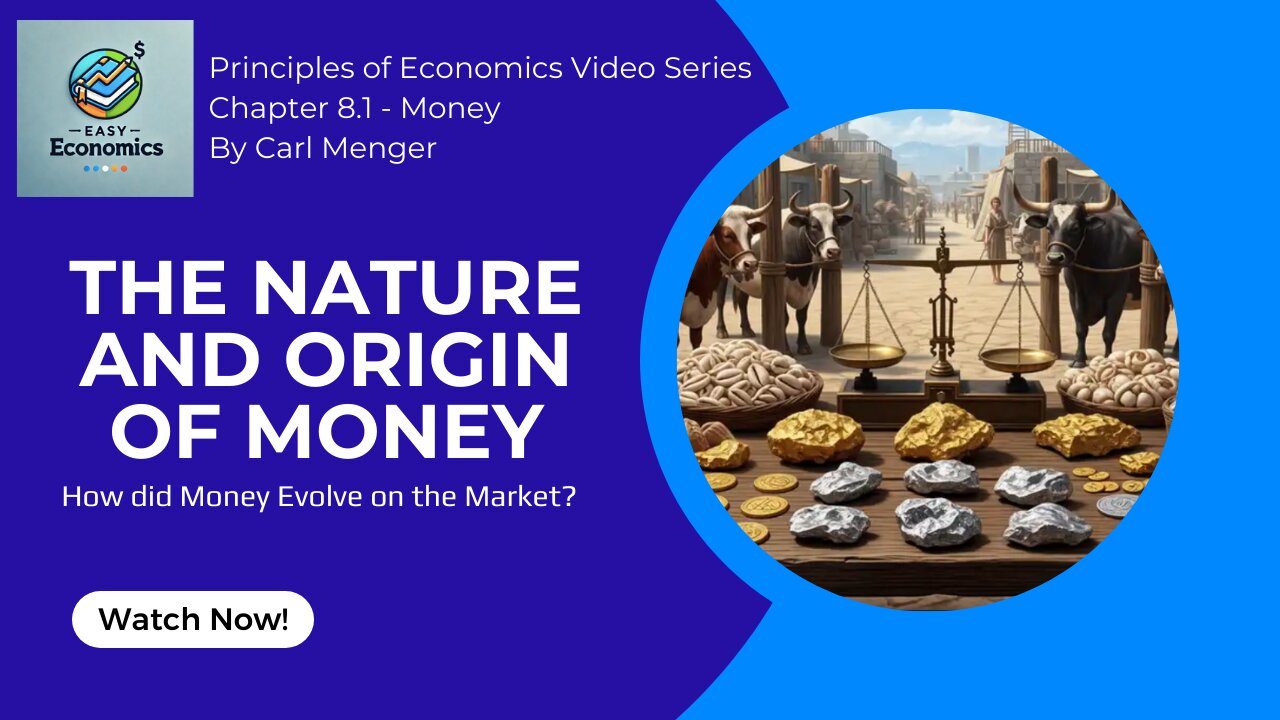
Principles of Economics by Carl Menger Chapter 8.1 - The Nature and Origin of Money
Principles of Economics by Carl Menger Chapter 7.2C - Circulability of Commodities
Principles of Economics by Carl Menger Chapter 7.2B - Differences in Marketability of Commodities
Principles of Economics by Carl Menger Chapter 7.2A - Marketability of Commodities
Principles of Economics by Carl Menger Chapter 7.1 - What is a Commodity?
Principles of Economics by Carl Menger Chapter 5.3C - Competition Policy
Principles of Economics by Carl Menger Chapter 5.3B - Price Formation by Competing Sellers
Principles of Economics by Carl Menger Chapter 5.3A - Price Forming and Distribution by Competition
Principles of Economics by Carl Menger Chapter 5.2D - Principles of Monopoly Trade
Principles of Economics by Carl Menger Chapter 5.2C - Market Dynamics of Monopoly Pricing
Principles of Economics by Carl Menger Chapter 5.2B - Price Forming in Monopoly Trade for Quantities
Principles of Economics by Carl Menger Chapter 5.2A - Price Formation in Monopoly Trade
Principles of Economics by Carl Menger Chapter 5.1 - Price Formation in Isolated Exchange
Principles of Economics by Carl Menger Chapter 5.0 - The Theory of Price
Principles of Economics by Carl Menger Chapter 4.2 - The Limits of Economic Exchange
Principles of Economics by Carl Menger Chapter 4.1 - Foundations of Economic Exchange
Principles of Economics by Carl Menger Chapter 3.3E - The Value of Land, Labour and Capital
Principles of Economics by Carl Menger Chapter 3.3D - The Value of Individual Higher Order Goods
Principles of Economics by Carl Menger Chapter 3.3C - Combined Value of Higher Order Goods
Principles of Economics by Carl Menger Chapter 3.3B - The Productivity of Capital
Principles of Economics by Carl Menger Chapter 3.3A - What Causes the Value of Higher Order Goods?
Principles of Economics by Carl Menger Chapter 3.2D - The Subjective Nature of the Measure of Value
Principles of Economics by Carl Menger Chapter 3.2C - Influence of the Quality of Goods on Value
Principles of Economics by Carl Menger Chapter 3 2B - The Value of Goods for Individual Needs
Principles of Economics by Carl Menger Chapter 3.2A - Difference in Importance for Individual Needs
Principles of Economics by Carl Menger Chapter 3.1 - The Theory of Value
Principles of Economics by Carl Menger Chapter 2.4 - What is Wealth?
Principles of Economics by Carl Menger Chapter 2.3 - Human Economy and Economic Goods
Principles of Economics by Carl Menger Chapter 2.2 - Available Quantities of Goods
Principles of Economics by Carl Menger Chapter 2.1 - Human Requirements in Economics
Principles of Economics by Carl Menger Chapter 2.0 - Economy and Economic Goods
Principles of Economics by Carl Menger Chapter 1.6 - Ownership of Goods
Principles of Economics by Carl Menger Chapter 1.5 - Causes of Human Prosperity
Principles of Economics by Carl Menger Chapter 1.4 -Time and Error in the Production Process
Principles of Economics by Carl Menger Chapter 1.3 - The Laws that Govern Goods Character
Principles of Economics by Carl Menger Chapter 1.2 - The Causal Connection Between Goods
Principles of Economics by Carl Menger Chapter 1.1 - The Nature of Goods
Principles of Economics by Carl Menger Chapter 8.1 - The Nature and Origin of Money
You want to read the book? Get it here: 👉
https://amzn.to/4exiAKW
Watch the next video in this series: Coming Soon!
Watch the video series from the start: https://rumble.com/playlists/I48mBTB4w2c
Watch our video about Carl Menger: https://rumble.com/v61z0l2-carl-menger-the-father-of-austrian-economics-and-subjective-value.html
Where did money come from—and who invented it? In this video, we explore Carl Menger’s Principles of Economics, Section 8.1: On the Nature and Origin of Money—a foundational explanation of how money emerged not by law, but through voluntary trade.
Early economies relied on direct barter. But bartering only works when two people each want exactly what the other has—at the same time. This “double coincidence of wants” was rare and made trade inefficient. So how did economies evolve beyond this?
Menger shows that people gradually realized they could accept goods not for their direct use, but because those goods were easier to trade. For example, a weaponsmith might accept cattle for his armor—not because he needed cattle, but because he knew others would. Over time, highly marketable goods like cattle, salt, or metal became stepping stones to what people really wanted.
Eventually, this habit of accepting certain tradable goods became widespread. These goods—accepted everywhere, for anything—became money. Not because a government declared them money, but because the logic of trade and the habits of people made them money.
Governments sometimes strengthened these goods by declaring them acceptable for taxes or debts. But that didn’t create money—it merely reinforced what the market had already chosen.
In short: money is a product of human action, not state planning. It emerged naturally as individuals sought better ways to trade.
❓ Questions This Video Answers:
-What is the true origin of money?
-Why did barter limit early trade?
-How did people solve the problem of double coincidence of wants?
-What makes a good naturally evolve into money?
-Did the state invent money?
-Why were goods like cattle used as early money?
-What role did habit play in the rise of money?
-How does indirect exchange improve trade efficiency?
-Can money exist without legal backing?
-What does Menger’s theory say about modern money?
00:00 - Introduction to the Nature and Origin of Money
00:09 - The Limitations of Early Trade
01:07 - The Natural Solution to Trade Emerges
01:50 - The Weapon Smith Example
02:31 - The Birth of Money
03:02 - The Role of Habit and Imitation
03:33 - The State’s Limited Role in the Origin of Money
04:04 - Conclusion
04:34 - Outro
#OriginOfMoney #CarlMenger #AustrianEconomics
-
 1:06:36
1:06:36
Wendy Bell Radio
8 hours agoPet Talk With The Pet Doc
44.4K24 -
 30:58
30:58
SouthernbelleReacts
2 days ago $5.58 earnedWe Didn’t Expect That Ending… ‘Welcome to Derry’ S1 E1 Reaction
24.4K8 -
 13:51
13:51
True Crime | Unsolved Cases | Mysterious Stories
5 days ago $14.14 earned7 Real Life Heroes Caught on Camera (Remastered Audio)
40.7K9 -
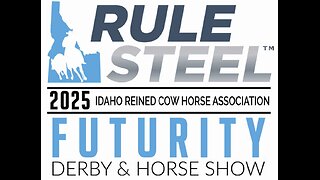 LIVE
LIVE
Total Horse Channel
14 hours ago2025 IRCHA Derby & Horse Show - November 1st
136 watching -
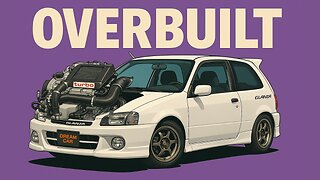 4:19
4:19
PistonPop-TV
6 days ago $5.78 earnedThe 4E-FTE: Toyota’s Smallest Turbo Monster
36.6K -
 43:07
43:07
WanderingWithWine
6 days ago $3.20 earned5 Dreamy Italian Houses You Can Own Now! Homes for Sale in Italy
27.5K9 -
 LIVE
LIVE
Spartan
23 hours agoFirst playthrough of First Berserker Khazan
148 watching -
 28:01
28:01
Living Your Wellness Life
2 days agoTrain Your Hormones
23K1 -
 43:28
43:28
The Heidi St. John Podcast
1 day agoFan Mail Friday: Faith Over Fear and Finding Strength in Every Season
13.7K -
 1:05:30
1:05:30
SGT Report
1 day agoTHE HORRIBLE TRUTH ABOUT EVERYTHING -- Harley Schlanger
56.3K95
